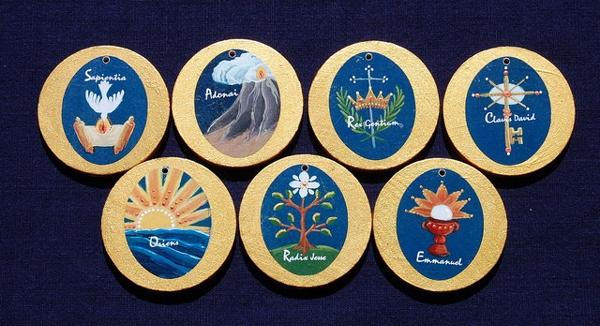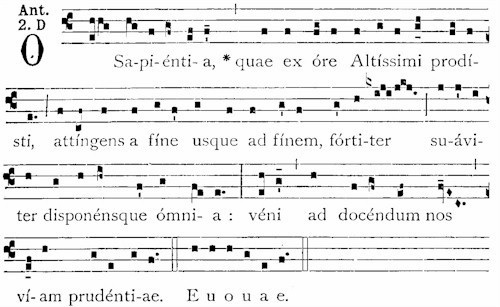
The Advent O Antiphons
The season of Advent is one of the richest of the liturgical year. It has elegiac hymns, passionate
and inspiring prophetic readings, and beautiful prayers. This all takes place, at least in the
Northern hemisphere, during a time of growing darkness, an apt context for the expression of
the human yearning for light, joy, and peace.
Among Advent’s treasures are the O antiphons. An antiphon is a short verse that frames the
singing of a psalm or canticle, giving seasonal focus and colour. The O antiphons are a series of
such verses used to accompany the singing of the Magnificat, the Song of Mary, at the evening
office. They have been in use in the Western Church since at least the 8 th century; some
scholars trace them back to the 4 th . They are sung from December 17-23. The antiphons draw
on a variety of Old Testament themes that express longing for the coming of the Messiah. They
repeat the imperative “Come!” and so continue to give voice to the longing of all for the
fullness of God’s reign of justice and peace.
Each antiphon begins with a Messianic title of Christ. In Latin these are
- O Sapientia (Wisdom),
- O Adonai (Lord and Ruler)
- O Radix Jesse (Root of Jesse)
- O Clavis David (Key of David)
- O Oriens (Dawn of the East)
- O Rex Gentium (King of the Gentiles)
- O Emmanuel (Emmanuel, God With Us)
When you put these titles in reverse order, the first letter of each forms an acrostic, spelling out
Ero Cras, meaning, “Tomorrow I will come.”
After each title there follows an expansion of the title. So, for example, “O Wisdom, coming
forth from the mouth of the Most High, reaching from one end to the other, mightily and
sweetly ordering all things.” The verb “come” follows, accompanied by a further elaboration of
the request to come: “and teach us the way of prudence.”
A tradition developed in England of beginning the antiphons on December 16 and including an
extra on the 23 rd that, instead of addressing Christ, is addressed to the Blessed Virgin Mary:
O Virgo virginum, quomodo fiet istud?
Quia nec primam similem visa es nec habere sequentem.
Filiae Jerusalem, quid me admiramini?
Divinum est mysterium hoc quod cernitis.
O Virgin of virgins, how shall this be?
For neither before thee was any like thee, nor shall there be after.
Daughters of Jerusalem, why marvel ye at me?
The thing which ye behold is a divine mystery.
When this antiphon is included, the acrostic becomes Vero Cras, “Truly,
tomorrow.”
The calendar of the Anglican Church of Canada’s Book of Common Prayer reflects this English
custom, marking December 16 as “O Sapientia”, though the book does not actually contain any
of the O antiphons.
Probably most people are familiar with the O antiphons in the form of the hymn “O Come, O
Come, Emmanuel.” The hymn, a paraphrase of the antiphons, was originally written in Latin.
The English version most widely sung is a translation by John Mason Neale (1818-1866), a priest
of the Church of England. We continue to sing many of his translations and compositions.
Common Praise has 27 of Neale’s hymns, including “All Glory, Laud, and Honour,” “Good King
Wenceslas,” “The Day of Resurrection,” and “Jerusalem the Golden.”
The meter of the hymn text means it can be sung to many different melodies commonly used
for hymnody. The tune most often associated with the text was composed independently.
Common Praise simply notes the source as “Processionale, 15 th century.” Specifically, it was a
processional chant at burials. The tune was paired with Neale’s translation in 1851 and has
largely swept all other tunes before it as the pairing is particularly felicitous. The arrangement
in Toronto. The melody has been quoted by composers and musicians ranging from Samuel
Barber and Zoltán Kodály to U2.
The Book of Alternative Services has yet another form of the O antiphons. They are arranged to
form a litany proposed for use during Advent. The congregational response, “Lord Jesus, come
soon!” amplifies the longing expressed in each invocation. We are using the Advent litany as
part of the gathering rite at the Eucharist this year.
While the O antiphons are associated with prayer at evening, they can, of course, be prayed at
any time. I will send the text of each with a short reflection from the 17 th to the 23 rd . The
antiphon could be included in prayer before a meal, on rising or going to bed, or indeed at
multiple times during the day.
Here are the text and reflection for December 17.

You can hear this antiphon sung here: https://www.youtube.com/watch?v=zvPM3VLv7MY
“O Wisdom, coming from the mouth of the Most High, reaching from one end to the other,
mightily and sweetly ordering all things: Come and teach us the way of prudence.”
The antiphon draws from a number of scriptural sources.
“O Wisdom” – Sirach 24:3; “coming from the mouth of the Most High” — Wisdom 8:1; cf.
Proverbs 8
Come and teach us the way of prudence – Proverbs 9:6 (following the translation of the
Vulgate); cf. Isaiah 40:14.
As mortal human beings, we have a limited perspective on the world. God, on the other hand,
sees all, and all that is seen by God is seen perfectly. The antiphon connects wisdom with
prudence. Prudence is the ability to use discerning judgement and skill in using resources and
achieving goals. Even with limited perspective, the Christians try to act in accordance with what
they know of the will of God. In the antiphon, we pray that we may genuinely perceive perfect
goals and achieve them by the most perfect means. Such wisdom is hidden, mysterious, elusive.
When the eternal Son of God took flesh, he was carried in the darkness of the Virgin’s womb. At
his death, darkness came upon the face of the earth (Matthew 27:45). His resurrection was
seen by no one. Christ is “the power of God and the wisdom of God” (1 Corinthians 1:24).
The antiphon speaks of wisdom’s role in creating the world, but wisdom also entails how to
respond when the world is marred by evil and suffering. Wisdom “gets its hands dirty.” It is
eminently practical. In praying the antiphon, we pray to be joined to both the creative power of
God and to God’s work of redeeming and restoring all things.
Kevin+

Recent Comments